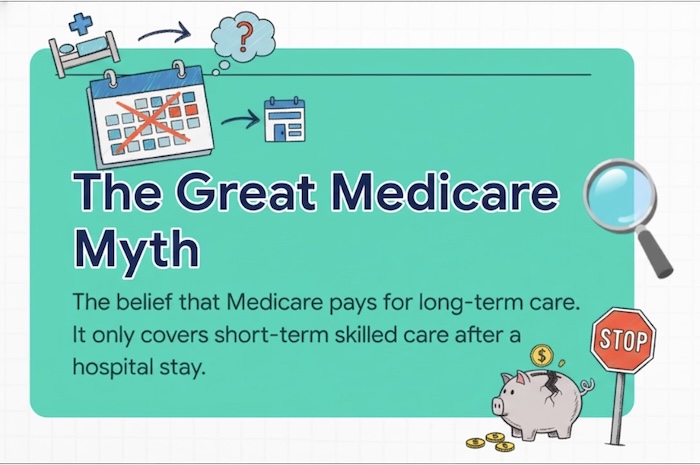Many families are surprised to learn that Medicare only pays for nursing home care for a limited time and only under specific conditions. Medicare covers skilled nursing care, not custodial care, and only when the person meets strict eligibility criteria.
TL;DR: Medicare covers up to 100 days of skilled nursing care per benefit period after a qualifying hospital stay. Coverage is only for skilled care, not long-term custodial care. After coverage ends, families may need to use Medicaid, long-term care insurance, or private pay funds.
If your loved one requires long-term care services, such as assistance with activities of daily living like bathing, dressing, or using the toilet, this type of care isn’t covered by Medicare.
Those costs are either paid out of pocket, through long-term care insurance, or by Medicaid if income and assets meet your state’s Medicaid office rules.

What Medicare Covers in a Skilled Nursing Facility
Skilled nursing facility (SNF) care provides skilled services and rehabilitation services for short-term recovery after an illness, surgery, or hospital admission.
Medicare pays for short-term stays only when all the following criteria are met:
- The person had a qualifying hospital stay of at least three consecutive days (each day is counted starting at midnight) as an inpatient (not including the day of discharge; observation services don’t count).
- Admission to a Medicare-certified skilled nursing facility occurs within 30 days of hospital discharge.
- The person needs daily skilled care, such as physical therapy, occupational therapy, speech therapy, or nursing services that can’t be provided in an outpatient setting or at home.
When these requirements are met, Medicare Part A (Hospital Insurance) helps cover the cost of SNF care during a benefit period.
How Long Medicare Pays and What It Costs
Each benefit period starts when a beneficiary is admitted as an inpatient to a hospital or SNF and ends when they’ve gone 60 days without skilled care. A new benefit period can begin if care is needed again later.
Medicare Part A coverage for a skilled nursing facility stay:
- Days 1–20: Medicare pays the full cost for a semi-private room, meals, medical services, rehabilitation services, and prescription drugs used during the stay.
- Days 21–100: The person pays a daily coinsurance (set annually by Medicare), and Medicare covers the remaining costs.
- After 100 days: Medicare coverage ends, and the person pays the full cost unless other coverage applies.
Private rooms are not covered unless medically necessary. The standard covered accommodation is a semi-private room.
If recovery reaches a plateau or the person no longer needs skilled care, Medicare coverage stops, even if 100 days haven’t been used.

What Medicare Doesn’t Cover
Medicare does not cover:
- Custodial care, which is help with personal needs when no skilled care is required
- Long-term residency in nursing homes (also known as intermediate care facilities, aka ICF)
- Non-medical support, like room, board, or social activities
These costs must be paid out of pocket, through long-term care insurance, or with Medicaid coverage for those who qualify financially.
Medicare Parts A, B, C, and D
- Medicare Part A pays for inpatient hospital and skilled nursing facility care.
- Medicare Part B covers outpatient medical services, including doctor visits and certain rehabilitation services.
- Medicare Part C (Medicare Advantage plans) are managed by private healthcare providers and must cover at least the same Medicare benefits, though rules and costs can vary.
- Medicare Part D covers prescription drugs.
Individuals with limited financial resources may qualify for Medicaid, which can help cover the costs of long-term care in nursing homes and other senior care housing options after Medicare benefits are exhausted. Contact your state’s Medicaid office for detailed resources and application help.
Common Reasons Older Adults Enter Skilled Nursing Facilities
Older adults often enter skilled nursing facilities after a hospital stay when they need short-term care to recover safely before returning home, wherever that may be.
These facilities provide daily skilled services that can’t be provided independently or administered by family caregivers.
Some common reasons for admission include:
- Recovery after surgery: such as joint replacement, heart surgery, or fracture repair
- Serious illness or injury: including stroke, pneumonia, heart failure, or hip fractures
- Rehabilitation needs: requiring physical therapy, occupational therapy, or speech therapy to regain strength, balance, or communication skills
- Complex medical conditions: like infections needing IV medications, wound care, or monitoring after a hospital admission
- Chronic conditions that temporarily worsen, such as COPD, diabetes, or kidney disease, require extra skilled care to stabilize health
These are typically short-term stays designed to help the person regain function and independence before returning home or to another senior care setting, such as assisted living. Families and professionals must work together with the facility’s healthcare providers to plan for discharge and continued care.
“As a former long-term care social worker and discharge planner, I can tell you that discharge planning begins on day one. Families should start thinking early about what happens after skilled nursing care ends, whether that means returning home with support and home health services, or exploring other long-term care options.” – Amie Clark, BSW
VIDEO: Does Medicare Cover Nursing Home Care?
What to Do If Medicare Stops Paying for Skilled Nursing Care
Oftentimes, families are told that Medicare coverage for skilled nursing facility care is ending because their loved one has reached a plateau or no longer meets the criteria for skilled nursing care. If this happens to you and you disagree with this decision, you have the right to appeal.
- Ask for a “Notice of Medicare Non-Coverage”
Before coverage ends, the facility must give you a written notice of non-coverage. This document explains the reason for the decision and how to request a fast appeal. If you don’t receive the notice, ask for it right away. - Request a Fast Appeal
You can call the Quality Improvement Organization (QIO) listed on the notice. This must be done no later than midnight of the day before Medicare coverage is scheduled to end.
Once you file the appeal:
- The QIO will review medical records to decide if the person still qualifies for skilled services.
- During the review, Medicare continues paying for care.
- You will be notified of the decision, usually within a day.
- If the Decision Is Denied
If the QIO upholds Medicare’s decision, you can continue the appeal through several higher levels:
- Reconsideration by a Qualified Independent Contractor
- Administrative Law Judge hearing
- Further review by the Medicare Appeals Council
Each step must be started quickly, so read the decision letter carefully for filing deadlines.
- Get Professional Support
Ask the facility’s social worker, administrator, or director of nursing to assist in gathering documentation that demonstrates a continued medical need, such as ongoing physical therapy, wound care, or rehabilitation services.
You can also contact your State Health Insurance Assistance Program (SHIP) for free help understanding Medicare benefits, appeals, and your rights as a beneficiary.
Average Cost of Nursing Home Care After Medicare Coverage Ends
When Medicare coverage runs out, families often face significant expenses. According to recent data from Genworth’s Cost of Care Survey, the national average cost of a semi-private room in a nursing home is around $9,277 per month, while a private room averages $10,646 per month.
Costs vary widely by state and by the level of medical services required. Facilities that provide extensive rehabilitation services, memory care, or skilled care may charge higher rates.
Tips for Finding Financial Help
- Medicaid: Contact your state’s Medicaid office to learn about Medicaid coverage for long-term care. Many nursing home residents rely on Medicaid after depleting their savings and assets.
- Long-term care insurance: Review any existing policies to see if they cover nursing home or custodial care.
- Veterans benefits: The VA Aid and Attendance benefit can help qualifying veterans and spouses with long-term care costs.
- State and local programs: Your local Area Agency on Aging can connect you to resources such as financial aid, home repair help, or adult day care programs.
- Social workers and discharge planners: They can explain coverage options and help complete applications for Medicaid or other funding programs.
How Placement Specialists and Discharge Planners Help Families
When Medicare coverage for skilled nursing care is ending, families often feel uncertain about what comes next. This is when placement and referral specialists and discharge planners can be invaluable partners.
Discharge planners (typically licensed social workers) help create a safe and coordinated plan for the person leaving the facility by arranging rehabilitation services, home health care, or help with transitioning to assisted living or other long-term care settings.
Placement and referral specialists expand that support by helping families explore senior housing options, compare costs, and understand Medicaid eligibility or long-term care insurance benefits.
Their goal is to match the person’s care needs, budget, and preferences with the right environment.
Together, these professionals help families make informed decisions, reduce stress, and create continuity of care once the skilled nursing stay ends.
Comparing Coverage: Medicare vs. Medicaid vs. Long-Term Care Insurance
| Feature | Medicare | Medicaid | Long-Term Care Insurance |
|---|---|---|---|
| Purpose | Short-term medical and rehabilitation coverage after a hospital stay | Safety-net program for people with limited income and assets | Private insurance designed to pay for long-term personal or nursing care |
| Who Qualifies | Adults 65+ or under 65 with qualifying disability | Must meet income and asset limits set by each state’s Medicaid office | Anyone who buys a policy (usually purchased before health declines) |
| Type of Care Covered | Skilled nursing facility (SNF) care, limited home health, hospice, and inpatient hospital care | Long-term care services in nursing homes, assisted living, or at home, depending on the state | Custodial care, assisted living, home care, or nursing home coverage, depending on policy |
| Length of Coverage | Up to 100 days of SNF care per benefit period if criteria are met | No set limit — coverage continues as long as eligibility is maintained | Depends on policy limits (often daily benefit × number of years) |
| Who Pays | Federal program; may require coinsurance after day 20 | Federal-state partnership; typically no cost to qualified participants | Private pay premiums; benefits paid out per policy terms |
| Covers Custodial Care? | ❌ No | ✅ Yes (if medically and financially eligible) | ✅ Often, depending on policy |
| Best For | Short-term rehabilitation after hospitalization | Long-term, ongoing care for those with limited finances | Middle-income adults planning ahead for potential future care needs |
In Summary
Medicare covers skilled nursing care only for a limited time, up to 100 days per benefit period after a qualifying hospital stay. It does not cover permanent nursing home residency or custodial care
Families and senior care professionals should understand how Medicare, Medicaid, and long-term care insurance work together to manage the high costs of extended long-term care for people with chronic conditions or complex medical needs.
Frequently Asked Questions
Medicare Part A covers up to 100 days of skilled nursing facility (SNF) care per benefit period.
Days 1–20: Medicare pays the full cost.
Days 21–100: You pay a daily coinsurance, and Medicare pays the rest.
After day 100: Medicare coverage ends, and you are responsible for the full cost unless you have other coverage such as Medicaid or long-term care insurance.
Once all 100 Medicare-covered days in a benefit period are used, you must pay the full cost of care if you continue staying in the facility. Some people qualify for Medicaid to help with long-term care costs. Others may transition to an out-of-pocket payment, private insurance, or return to home with home health or rehabilitation services arranged by their care team.
No. Medicare days reset by benefit period, not by calendar year.
A new benefit period starts after you’ve gone 60 consecutive days without receiving inpatient hospital or skilled nursing care. When a new benefit period begins, you are again eligible for up to 100 covered SNF days if you meet all other requirements.
Medicare does not pay for 24-hour care at home. Medicare’s home health benefit covers intermittent skilled nursing, physical therapy, occupational therapy, and speech therapy for those who are homebound and under a doctor’s care. However, it does not pay for continuous or custodial care such as help with bathing, dressing, or toileting on a 24-hour basis.
If you receive a notice that Medicare coverage is ending but believe your loved one still needs skilled care, you have the right to appeal. 1) Ask for the Notice of Medicare Non-Coverage from the facility. 2) File a fast appeal with your local Quality Improvement Organization (QIO) before midnight of the day before coverage ends. If denied, continue appealing to higher levels listed in the decision letter.
About the Author

Amie Clark is a senior care expert with over 25 years of experience in aging services, caregiving, and senior housing. She combines her professional expertise and personal caregiving insight to help families navigate aging, long-term care, and end-of-life decisions with clarity and compassion.














There is a lot of confusion about admission vs observation to hospital. ER Dr may say we’ll admit the person but turns out only observation so 3 days later at discharge medicare won’t cover skilled nursing home. Leaving families scrambling. Also if the patient can not/will not participate in rehab coverage ends. Very difficult w/person w/Alz to understand and follow routines/instructions.
So true – Thank you for sharing Harriet!